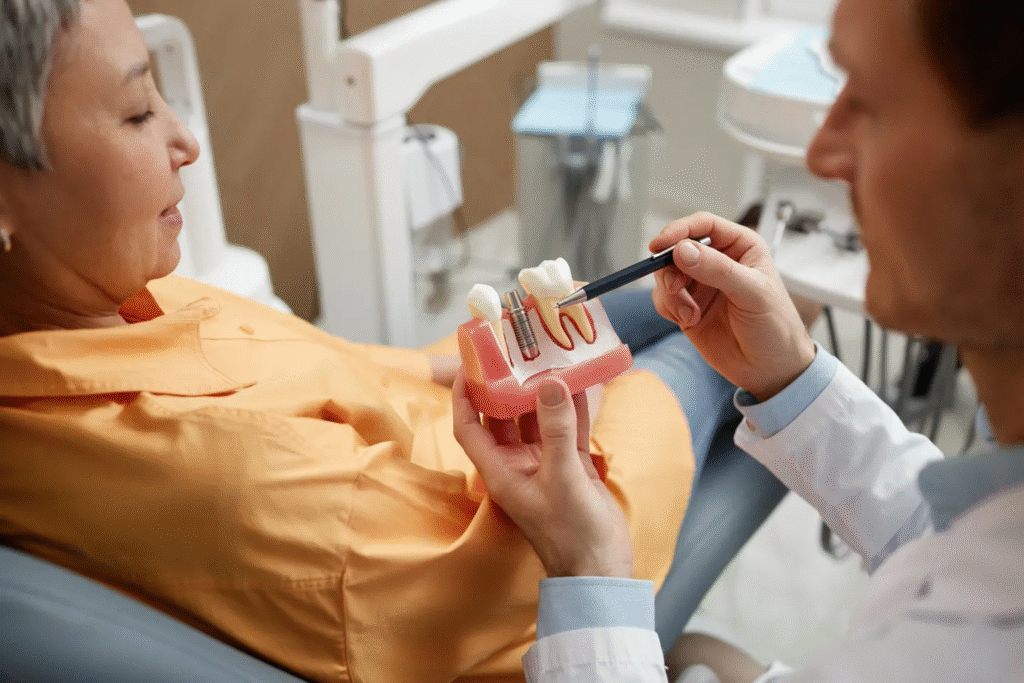Implant Dentist Qualifications
According to the American Dental Association, all dentists are qualified to place dental implants. While it is legal for any licensed dentist to place dental implants, implant dentists have more advanced training and experience. Dentists who specialize in implants receive more formal training and education to perform these procedures with a high degree of success.
Implant dentists have additional training and experience with anticipating, diagnosing, and treating surgical complications. Since implant dentists focus on implant procedures, they perform them more often than general dentists. Their extensive experience provides patients with a safety and comfort level that does not exist when dentists with less training and experience perform these procedures.
Dental Implant Procedures
Dental implant procedures involve inserting an implant to act as an artificial root, anchoring a custom restorative device. There are two major types of dental implants: endosteal and subperiosteal. Endosteal implants are the most commonly used and are placed in the jawbone, usually made of titanium and shaped like small screws.
Subperiosteal implants are placed under the gum but not in the jawbone. They are best for patients who lack sufficient healthy jawbone and cannot undergo bone rebuilding procedures, though bone augmentation, sinus lifts, or ridge expansions can sometimes provide a foundation for standard implants.
Dental Implants vs. Dentures
Dental implants and dentures are both common options for replacing missing teeth. Implants are a permanent solution that mimics natural teeth in appearance and function. Dentures are removable appliances that replace missing teeth and some gum tissue.
Many patients opt for implants due to their stability and natural feel. However, implants require healthy gums and sufficient jawbone support. Dentures may be preferable for patients with compromised gum health or inadequate bone structure.
Alternative Implant Options
While implant-supported crowns are a popular solution for single missing teeth, implant dentists can also provide implant-supported bridges and dentures. Bridges can restore multiple teeth at once, with the number of implants determined by the span size. Implant-supported dentures anchor a full arch securely, offering better fit and comfort than traditional removable dentures while preserving jawbone health.
When to Seek an Implant Dentist
According to the American Academy of Implant Dentistry, almost anyone missing at least one tooth can receive an implant once facial growth is complete. Ideal candidates are in good general health, have healthy gums, and possess enough bone to support an implant. Good oral hygiene and regular dental visits are also key factors.
People with one or more missing teeth can benefit from implant dentistry. In severe cases, implant dentists can replace all of a patient’s teeth with full-arch solutions, significantly improving appearance, function, and confidence.
FAQs About Implant Dentist
Q. What are the success rates of implant dentist procedures?
The success rate of dental implant procedures is typically very high—up to 98%—but depends on oral hygiene and implant location.
Q. Are dental implants removable?
No, dental implants are fixed permanently in the jawbone and function like natural teeth. They can only be removed by a dentist if medically necessary.
Q. Why do people prefer to see implant dentists for replacement teeth?
Patients choose implants because they look, feel, and function most like real teeth, offering superior comfort and longevity compared to other options.
Q. Are dental implant procedures safe?
Yes, dental implants are safe and effective. Like any surgery, there is a risk of complications, but following aftercare instructions minimizes these risks.
Q. How do I take care of my new teeth after seeing an implant dentist?
Care for implants as you would natural teeth: brush and floss daily, and maintain regular dental check-ups. With proper care, implants can last for decades.
Important Dental Terminology
- Cosmetic Dentistry – Dental work that improves the appearance (though not necessarily the function) of teeth, gums, and bite.
- Decay – Erosion of tooth enamel by plaque and tartar, leading to cavities.
- Dental Caries – Another term for cavities, resulting from bacterial decay forming holes in teeth.
- Dental Checkup – A routine appointment for cleaning and inspecting teeth to prevent and detect oral issues.
- Dental Filling – Material (metal, alloy, porcelain, or composite) used to restore tooth structure after decay removal.
- Dental Prophylaxis – Professional cleaning that removes plaque, calculus, and stains from teeth.
- Dental Sealants – Resinous coatings applied to chewing surfaces to prevent cavities.
- Dentist – A professional specializing in diagnosing and treating oral health conditions.
- Gingivitis – Inflammation of gum tissue caused by plaque and infection.
- Preventive Dentistry – Practices aimed at maintaining oral health to prevent disease.
- Tartar – Hardened plaque on teeth that requires professional removal.
- Tooth Enamel – The hard, protective outer layer of a tooth covering dentin and pulp.
